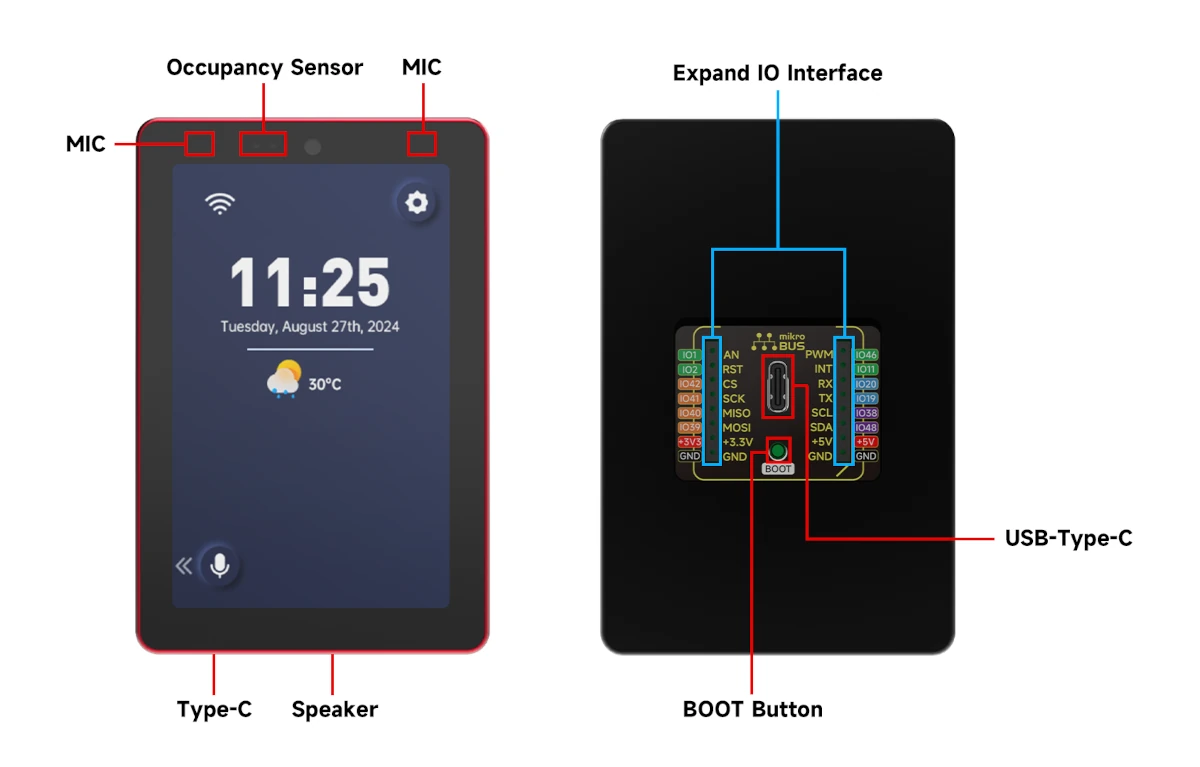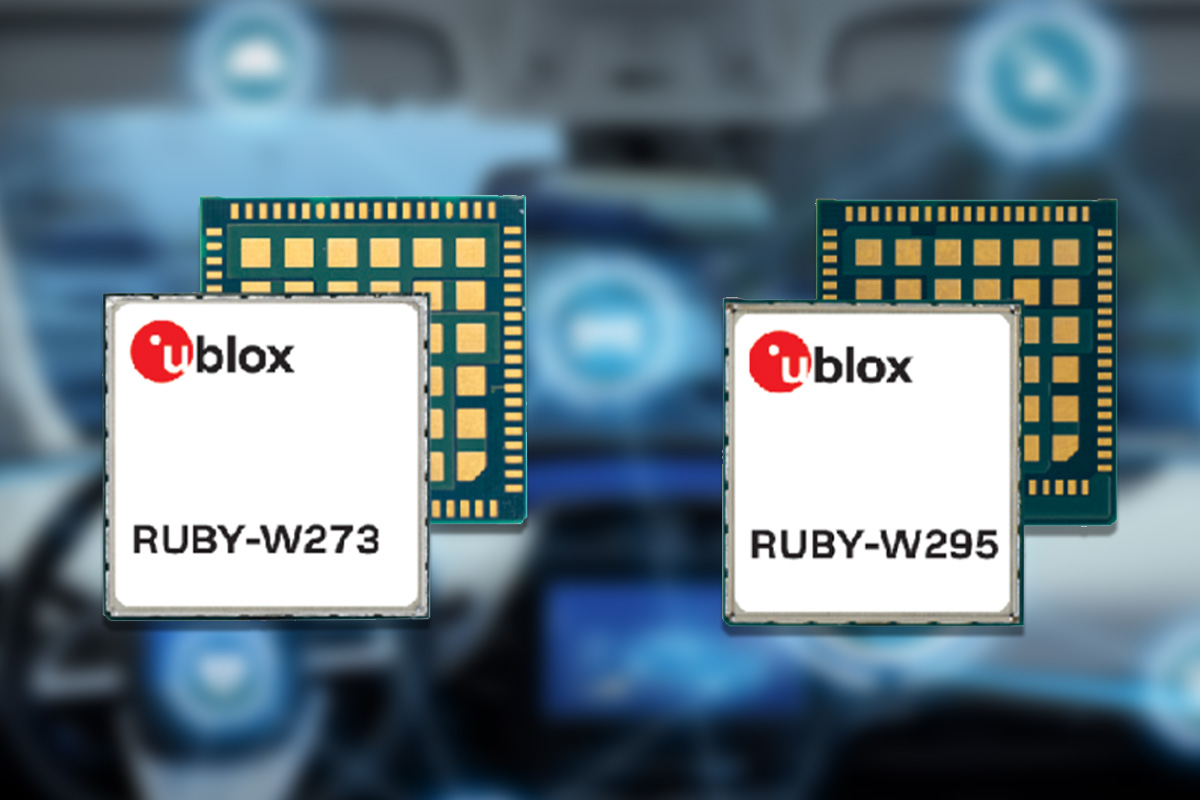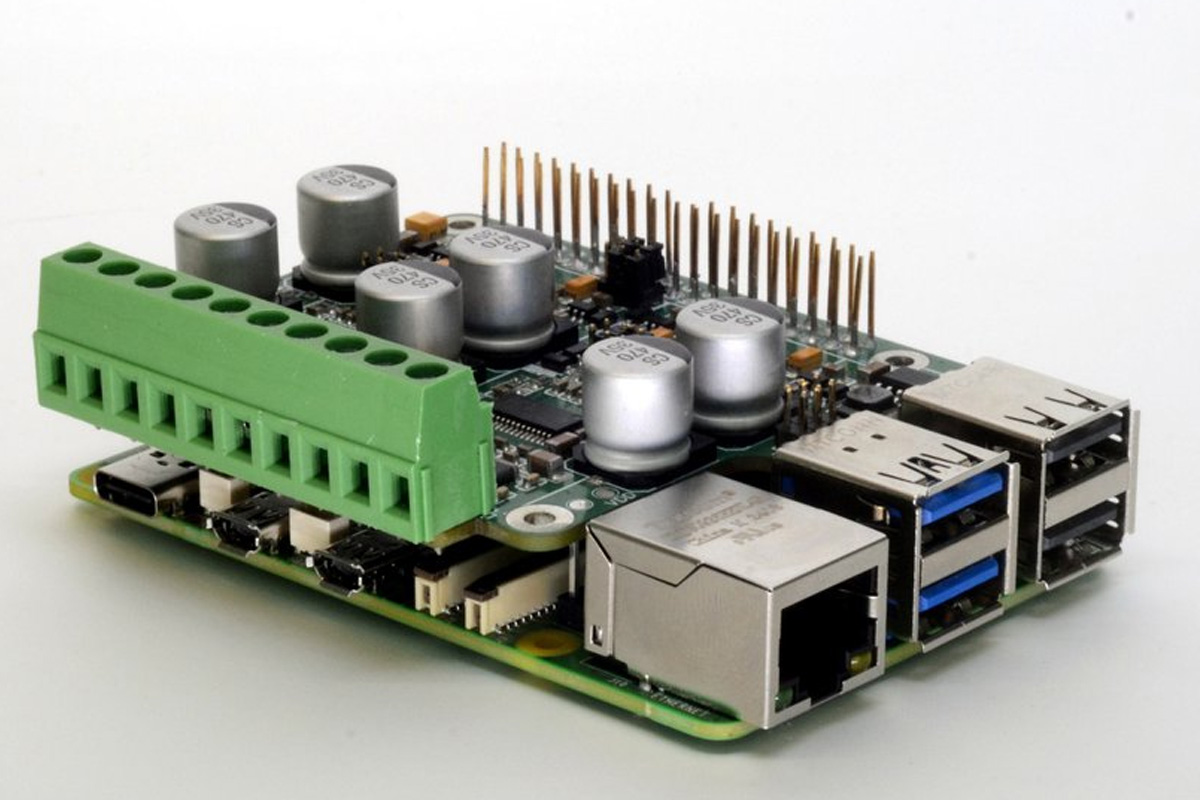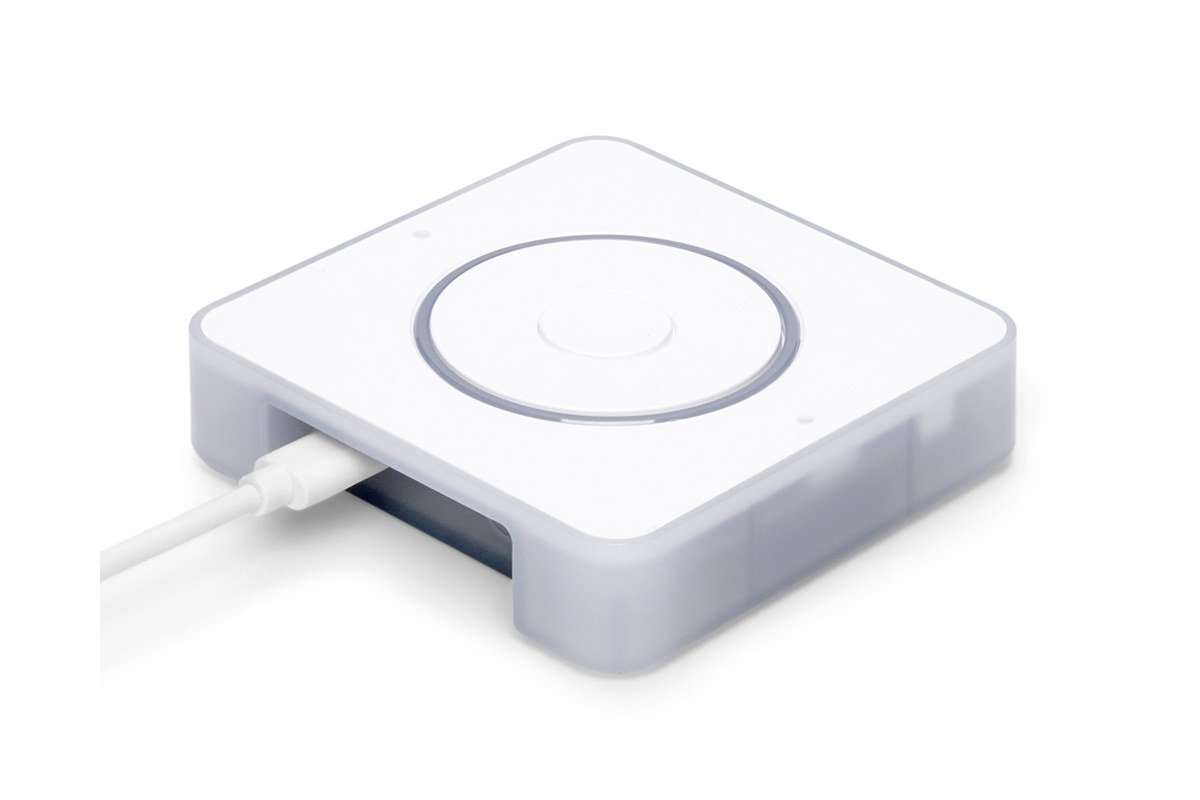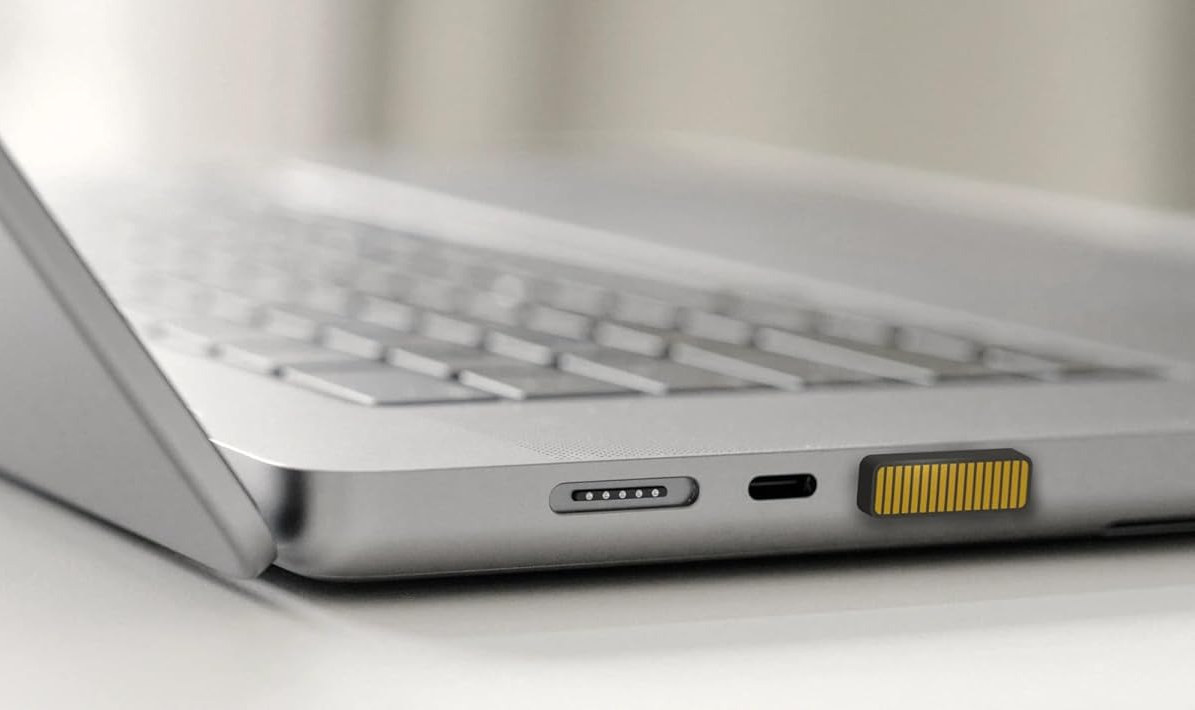The ESP32 Agent Dev Kit is an ESP32-S3-powered voice assistant that offers integrations with popular LLM models such as ChatGPT, Gemini, and Claude. Wireless-Tag says the Dev Kit is suitable for “95% of AIoT applications, from smart home devices to desktop toys, robotics, and instruments” In some ways, it is similar to the SenseCAP Watcher, but it has a larger, non-touch display and dual mic input. It however does not support local language models. It also features a standard MikroBUS interface for expansion. For voice capabilities, the ESP32 Dev Kit integrates two onboard, noise-reducing microphones and a high-fidelity speaker. The built-in infrared laser proximity sensor detects human proximity and movement for “smart interactive experiences”. ESP32 Agent Dev Kit specifications: MCU – ESP32-S3 dual-core Tensilica LX7 microcontroller @ 240MHz, 8MB PSRAM Storage – 16MB flash Display – 3.5-inch Touchscreen, 480×360 resolution Camera – 5MP OmniVision OV5647 camera module, 120° field of […]
u-blox RUBY-W2 is a family of Wi-Fi 7 automotive-grade modules for infotainment and telematics applications
u-blox has recently released the RUBY-W2 series (RUBY-W273-05A and RUBY-W295-05A) of automotive Wi-Fi 7 modules designed for advanced infotainment and telematics applications. These modules support tri-band Wi-Fi 7 and dual-mode Bluetooth 5.4, with up to Gbps (PHY) of throughput, supporting simultaneous use cases for in-car hotspots, Apple CarPlay, and multi-client video streaming. Key features of this module include Multi-Link Operation (MLO) with Dual Band Simultaneous (DBS) and High Band Simultaneous (HBS) modes, 2×2 MU-MIMO, Bluetooth LE Audio, long-range Bluetooth, security with WPA2/3, and secure boot. The modules are based on Qualcomm’s QCA6787AQ or QCA6797AQ automotive chipsets and connect to the host via PCIe for Wi-Fi and UART/PCM for Bluetooth. RUBY-W2 specifications: Chipset Qualcomm QCA6787AQ for RUBY-W273 Qualcomm QCA6797AQ for RUBY-W295) Wireless Tri-band Wi-Fi 7 (802.11 a/b/g/n/ac/ax/be) RUBY-W273 – Dual Band Simultaneous (DBS) (2.4 GHz + 5/6 GHz) RUBY-W295 – High Band Simultaneous (HBS), any two bands (2.4, 5, or 6 […]
Eclipsa Audio is an open, royalty-free alternative to Dolby Audio
Samsung announced Eclipsa Audio 3D technology, a royalty-free alternative to Dolby Audio, would be integrated into TVs and Soundbars in its 2025 lineup at CES 2025. The press release explains the 3D audio technology was developed in partnership with Google and that “Eclipsa Audio allows creators to adjust audio data such as the location and intensity of sounds, along with spatial reflections, to create an immersive three-dimensional sound experience”. Like 90% of announcements at CES 2025, Eclipsa Audio appeared to be mostly fluff. I also noticed it was developed through the Alliance for Open Media which manages the now-widely-used AV1 video codec, but a search for Eclipsa did not return anything. Luckily the “Arm Editorial Team” saved the day with an interesting article published a couple of days ago with more information about Eclipsa Audio. So let’s have a look. Eclipsa Audio is a multi-channel audio surround format that leverages […]
HiFi-Amped is a Raspberry Pi Audio HAT with dual DACs and class-D amplifiers
Sonocotta’s HiFi-Amped is a Raspberry Pi Audio HAT designed for Raspberry Pi single-board computers. It features dual PCM5100 DACs and TPA3110 (2x15W @ 8-Ω or 1x 30-W @ 4-Ω) class D amplifiers for high sound quality and power efficiency. Key features of this module include support for both small and large speakers, an external power source to drive speakers and power the Raspberry Pi, and the ability to shut down the amplifiers using GPIO pins for minimal noise when not in use. This makes it ideal for creating a Raspberry Pi-based media center or audio streaming setup. HiFi-Amped specifications: Compatibility – Raspberry Pi 2, 3, 4, 5, Zero, and potentially others with a Raspberry Pi-compatible GPIO header Amplifier – 2x Texas Instruments TPA3110D2 Class-D amplifiers Output Power 4x 10W into 8 ohms @ 13V 4x 15W into 8 ohms @ 16V 2x 30W into 4 ohms @ 16V (bridged mode) […]
$59 Voice “Preview Edition” adds an offline smart speaker to your Home Assistant server
Nabu Casa has just launched the Home Assistant Voice Preview Edition, a little ESP32 device with an XMOS XU316 audio processor, a dual-microphone array, an internal speaker, and a 3.5mm audio jack, that adds offline smart speaker functions to your Home Assistant server through WiFi. If your Home Assistant server is powerful enough, voice processing will be done directly on your local hardware using Home Assistant Voice software, but with lower-end hardware like a Raspberry Pi 4, audio processing can be done via a privacy-focused cloud instead. The solution also supports expansion thanks to a Grove connector on the bottom of the device. Voice Preview Edition specifications: SoC – Espressif ESP32-S3 dual-core Xtensa LX7 @ up to 240 MHz with vector extension for ML acceleration, 2.4 GHz WiFi & Bluetooth 5.0 LE connectivity Memory- 8 MB octal PSRAM Storage – 16 MB flash Audio DSP/Processor – XMOS XU316 with 16 […]
LILYGO T-Bao tiny AI robot combines ESP32 and Kendryte K210 RISC-V chip, features camera and display
The T-Bao AI robot is a compact embedded device/robot that combines an ESP32 and a K210 RISC-V microcontroller and can perform face recognition and robotics applications. This compact device features a 1.54-inch 240×240 capacitive touch screen, a 2MP OV2640 camera, a MAX98357A I2S audio amplifier, a DRV8833 motor driver, an MPU6050 6-axis motion sensor, and an AXP202 PMU for power management. Additionally, it supports USB charging, offers LEGO blocks compatibility, and can move around with integrated caster wheels. These features make it usable for educational projects, robotics, IoT applications, and embedded systems prototyping. LILYGO T-Bao specifications SoCs Kendryte K210 dual-core 64-bit RISC-V processor @ 400 MHz with 8MB on-chip RAM, various low-power AI accelerators delivering up to 0.5 TOPS ESP32-D0WDQ6-V3 dual-core Xtensa LX6 processor, 240 MHz, 16MB Flash, 8MB PSRAM Display – 1.54-inch capacitive touch LCD (240×240) Camera – 2MP OV2640 with rolling shutter, UXGA (1600 x 1200) resolution, 180-degree […]
SoundSlide capacitive touch USB-C adapter aims to ease volume control on laptops
SoundSlide is an open-source hardware USB-C adapter that adds a capacitive touch interface to your laptop or keyboard PC in order to control the volume without having to reach out to the volume keys on the keyboard that may require Alt or Fn presses. SoundSlide is meant to be more intuitive than pressing keys and works without drivers with macOS, Windows, and Linux. At just 20.9 x 6.9 x 3.5 mm in size excluding the USB Type-C port, you can leave it connected to your laptop when you move around or put the laptop in your backpack. The SoundSlide relies on the touch interface from the Microchip SAM D11 Arm Cortex-M0+ microcontroller, and the company behind the project – Drake Labs – has made the firmware, schematics (PDF/WebP), and a command-line interface written on Go available on GitHub. You can check out how it works on a laptop in the […]
Black Friday and Cyber Monday 2024 – International deals and coupons
While Black Friday and Cyber Monday used to be a US-only event, it changed many years ago, and we’ve been writing about international Black Friday and Cyber Monday deals and coupon codes since 2014, since a large portion of our audience cannot benefit from promotions on Amazon’s Black Friday and Cyber Monday events that will take place from November 21 until December 2 this year. So I’ve gathered some international Black Friday and Cyber Monday 2024 deals and discount coupon codes from relevant manufacturers and popular online stores such as Aliexpress, Banggood, and others. Aliexpress Black Friday and Cyber Monday event Aliexpress’ Black Friday and Cyber Monday 2024 event has already started. There are three periods: Nov 19-21 PST – Warm Up event where users can find and add items to the cart before purchasing during the main event. Nov 22-30 PST – “On Sale” event with discounts up to […]


